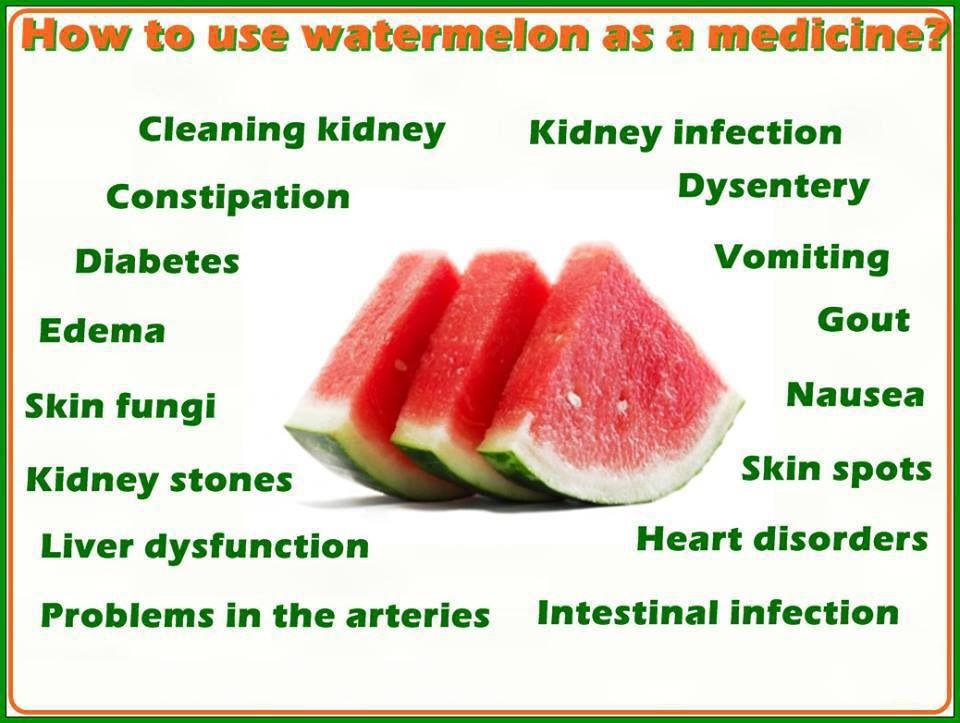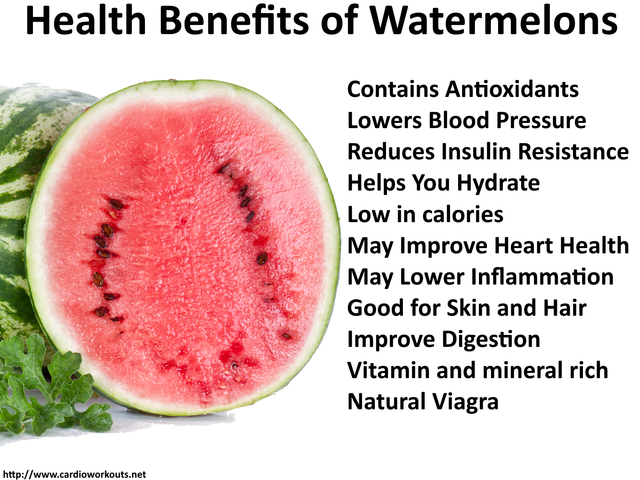Watermelon benefits
Here are the top 9 health benefits of eating watermelon.

Helps You Hydrate. ...
Contains Compounds That May Help Prevent Cancer. ...
May Improve Heart Health. ...
May Lower Inflammation and Oxidative Stress. ...
May Help Prevent Macular Degeneration. ...
May Help Relieve Muscle Soreness. ...
Is Good for Skin and Hair. ...
Can Help Improve Digestion.
Home › Fruits › Watermelon
9 Amazing Benefits Of Watermelon
The health benefits of watermelon include prevention of kidney disorders, high blood pressure, cancer, diabetes, heart diseases, heat stroke, macular degeneration, and impotence.
What Is Watermelon?
Watermelon is a fruit that grows on a vine-like flowering plant native to Southern Africa. It was cultivated in the Nile River Valley, in Egypt, and eventually in China, roughly 1,000 years ago. Now, watermelon is grown around the world, and in 44 of the 50 states in America. It is specifically selected to grow larger and juicier, resulting in the huge fruits that many of us are familiar with. The green outer rind is hard and fleshy, and rarely eaten, while the interior is soft, red or pink flesh containing many seeds; this is the part of watermelon which is typically eaten.
Total Fat: 0g (0%)
Total Carbohydrate: 21g (7%)
Dietary Fiber: 1g (4%)
Sugars: 20g
Cholesterol: 0mg (0%)
Sodium: 0mg (0%)
Potassium: 270mg (8%)
Protein: 1g
Vitamin A: (30%)
Vitamin C: (25%)
Calcium: (2%)
Iron: (4%)
Health benefits

Watermelon's high levels of lycopene are very effective at protecting cells from damage and may help lower the risk of heart disease, according to a study at Purdue University. A study published in the American Journal of Hypertension found that watermelon extracts helped reduce hypertension and lower blood pressure in obese adults.
Watermelon may be especially important for older women. A study published in Menopause found that postmenopausal women, a group known to have increased aortic stiffness, who took watermelon extract for six weeks saw decreased blood pressure and arterial stiffness compared to those who did not take watermelon extract. The authors of the study attributed the benefits to citrulline and arginine.
Arginine can help improve blood flow and may help reduce the accumulation of excess fat.
Anti-inflammatory properties
"The lycopene in watermelon makes it an anti-inflammatory fruit," Jarzabkowski said. Lycopene is an inhibitor for various inflammatory processes and also works as an antioxidant to neutralize free radicals. Additionally, the watermelon contains choline, which helps keep chronic inflammation down, according to a 2006 article published in Shock medical journal.
Reducing inflammation isn't just good for people suffering from arthritis. "When you're sick, you have cellular damage, which can be caused by a variety of factors including stress, smoking, pollution, disease, and your body becomes inflamed," Jarzabkowski said. "It's called 'systemic inflammation.'" In this way, anti-inflammatory foods can help with overall immunity and general health.
Hydration
"Watermelons help with overall hydration, and that is a great thing," said Lemond. "They say we can get 20-30 percent of our fluid needs through our diet alone, and foods like these certainly help." Additionally, their juice is full of good electrolytes. This can even help prevent heat stroke.
Digestion
The watermelon contains fiber, which encourages a healthy digestive tract and helps keep you regular.
Skin and hair benefits
Vitamin A is stellar for your skin, and just a cup of watermelon contains nearly one-quarter of your recommended daily intake of it. Vitamin A helps keep skin and hair moisturized, and it also encourages healthy growth of new collagen and elastin cells, according to the Cleveland Clinic. Vitamin C is also beneficial in this regard, as it promotes healthy collagen growth.
Muscle soreness & athletic performance
Watermelon-loving athletes are in luck: drinking watermelon juice before an intense workout helps reduce next-day muscle soreness and heart rate, according to a 2013 study published in the Journal of Agricultural and Food Chemistry. This can be attributed to watermelon's amino acids citrulline and arginine, which help improve circulation.
A 2015 study published in the Journal of Applied Physiology suggests that watermelon's citrulline may also help improve athletic performance. Study participants who took citrulline supplements saw a boosted performance with more power production in high-intensity exercise like cycling and sprinting.
Cancer prevention
Like other fruits and vegetables, watermelons may be helpful in reducing the risk of cancer through their antioxidant properties. Lycopene in particular has been linked to reducing prostate cancer cell proliferation, according to the National Cancer Institute.
Health risks
If eaten in reasonable amounts, watermelons should produce no serious side effects. If you eat an abundance of the fruit daily, however, you may experience problems from having too much lycopene or potassium.
The consumption of more than 30 mg of lycopene daily could potentially cause nausea, diarrhea, indigestion and bloating, according to the American Cancer Society.
People with serious hyperkalemia, or too much potassium in their blood, should probably not consume more than about one cup of watermelon a day, which has less than 140 mg of potassium. According to the National Institutes of Health, hyperkalemia can result in irregular heartbeats and other cardiovascular problems, as well as reduced muscle control.
Loading up on water-dense foods like watermelon can be tempting for those looking to lose weight because they help you feel full, but Lemond cautions against going to extremes. "Eating more fruits and vegetables of any kind naturally helps decrease overall calories (energy) of the diet," she said. "We know that people that eat higher quantities of fruits and vegetables typically have healthier body weights However, I do not recommend eating only watermelon … You will lose weight, but that weight will be mostly muscle."
Jarzabkowski also warned watermelon lovers to be mindful of their sugar intake. "Though watermelon's sugar is naturally occurring, [watermelon] is still relatively high in sugar."
"My recommendation is always to vary your selections," said Lemond. "Watermelon is a great hydrating food, so keep it in along with other plant foods that offer other benefits. Variety is always key."